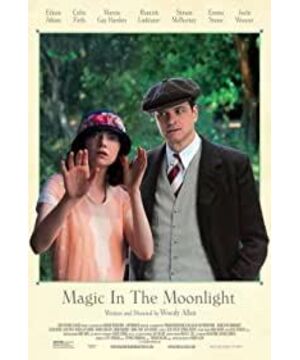Magic in the Moonlight evaluation action
-
Stephan 2022-03-29 09:01:04
Woody's soundtrack and pictures are beautiful to the bone, but this one does have a bit of love. I thought it would have an unexpected ending. Seeing the two hugging and getting back together is really a bit of a downgrade... But if you lie, you can make people Why not be a little more optimistic
-
Wava 2022-03-28 09:01:07
The marriage proposal is simply a model of Darcy's arrogance. When they said, "I don't know why I'm so intrigued by you, you didn't quickly thank Dade for coming to kneel and lick", they roared in their hearts, "I love you so much, I don't have you for a second. I can't live either, please run over and save me with your love!!"
-
Stanley: I'm beginning to question my own common sense.
Aunt Vanessa: I've always questioned your common sense.
-
Stanley: Live dangerously, I say. You only live once. Or maybe two or three times, depending on your supply of ectoplasm.











